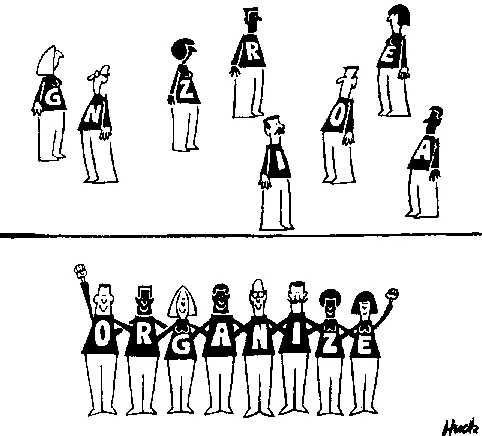Let’s Get Organized!

If working families hadn’t organized throughout history, we would all be working for a slavery subsistence. Everything above bare subsistence came from organizing. As union leader Walter Reuther said:
"You could take everything the bosses ever gave you of their own free will and put it in your eye. You wouldn't even blink!"
Our opponents make organizing as difficult as possible, but technological developments have recently improved our chances.
We organize by communities, by interests, and by workplaces.
Anyone who wants to try a well-paying apprenticeship in the Building Trades should click on https://nabtu.org/apprenticeship-and-training/.
Anyone in the Dallas AFL-CIO counties should contact Community Liaison Britni Cuington at britni.cuington@gmail.com.
Organizing by Workplace
“The boss don’t care when a worker squawks, but he has to listen when the union talks”
The AFL-CIO webinar on "Organizing Your Workplace" was posted 9/28/23 at https://aflcio.org/aflciotv
Unions are the most powerful organizations for working families. Generally, we organize people who have the same employer and/or the same workplace. In a few cases, unions have been formed by workers in the same or similar job category even though they may have different employers.
A good way to find out more about unions and to start getting involved is to join Working America on-line. Joining gives some of the benefits of union membership, but not as many as the rights that can be gained from a union contract.
First: Keep It a Secret!
Get a professional organizer before you start talking.

Employers generally do not like unions, no matter what they might say. They nearly always try to retaliate against anybody who lets it be known that they want to unionize. Government pretends to be neutral, but they usually aren’t. Consequently, union organizing drives are almost always conducted in secret. If you are serious about starting a union, don’t start by talking about it. Start by getting a professional organizer.
Professional union organizers know the ins and outs of labor law. They know what actions are protected by law and what actions leave workers open to being fired. They treat all information as confidential. Ideally, the employers should not know that an organizing drive is underway until the members are ready for them.
Information Is Critical
Union organizers are eager to get worthwhile organizing leads. They need basic information about the proposed bargaining unit before they will commit to a drive.
Below are some questions that a professional organizer might ask. If you send the information to your local AFL-CIO, we’ll find the right organizer for your situation:
Does your target workplace already have union representation?
Do you think you could get 10 or more workers to sign up for an internal organizing committee?
Have you already joined Working America?
Do you know of any earlier attempts to organize at your target workplace?
What is your contact information?
Who is the employer or company?
What kind of work or product goes on?
Where is the workplace?
About how many workers might eventually join?
About how many are women? How many Latinos? How Many African-Americans?
About how many would work with you now, before the drive starts, on an organizing committee?
Estimate the approximate average wage?
What is the predominant language the workers speak?
What issues hold the most interest among your workers? For example:
- Unfair policies on promotions
- Unfair policies on shift preference, layoffs, or other decisions
- Low wages
- No respect on the job
- Racism
- Male chauvinism
- Other unfair management policies and activities
(If you know how to cut and paste, you could send these questions along with your answers to your local Dallas Central Labor Council President genelantz.dallasaflcio@gmail.com. Or just contact Gene Lantz for more information.
Organizing by Community

In our area, the Texas Organizing Project (TOP) gives us a good way to organize by communities. Texas New ERA Center/JWJ is another one close to the Dallas AFL-CIO Central Labor Council. There are also on-line options such as Next Door and Meetup.
Organizing by Interests
The National Association for the Advancement of Colored People (NAACP) is a good example of organizing by interests. The union movement has a number of Constituency Groups based on interests.
One can Google dozens of other interest groups that are eager to get new members.
Some miscellaneous free information
National AFL-CIO's "Four Steps to Get You Started". The national labor federation is a great place to get information. It encourages joining Working America. It says to get a professional union organizer. It starts with a short summary of legal rights. It doesn't seem to say anything about keeping the drive secret.
Organize with Ironworkers Local 263. Our own North Texas Ironworkers have a good organizing section on their web site. Your organizing target may not be in their field, but you can learn from their long experience.
Organizing a union on the job. Essentially encourages union organization and refers people to state and local people. Mentions “Working America” as important.
Five Basic Steps to Organizing a Union pretty good basic ideas, but it’s only for United Electrical Workers. Also, it doesn’t caution people against trying to do it without a professional organizer. On the upside, it lists some of the information needed.
How to Organize. Doesn’t emphasize secrecy at all, so it seems a bit naive. Does differentiate between public and private sector. Very general discussion.
Know Your Rights. Gives a person’s rights under National Labor Relations Act. However it doesn’t say that the employer may find some illegal method of retaliation.
Unionize Your Workplace. Cheerful with cartoons. It does caution about secrecy but I think the overall impression is that organizing a union is kind of easy. It suggests that the union will be happy to help you.
Organizing Your Community. Very good overview that includes excellent definition of community organizing, what it is not, history of it, some goals and tactics that have been used. Best definition I’ve seen, “Community organizing is a process where people who live in proximity to each other come together into an organization that acts in their shared self-interest.”
Principles for Community Organizing. A list of 20 good principles gained from experience
Organizing Principles. No-nonsense organizing principles and ideas
A community campaign to achieve the Goals and reform education. Formal plan for one goal – reforming education.
Organizing for Power, Organizing for Change Asks people to sign up.
Legislative Interest Groups. 30-minute video on interest groups formed to promote or oppose legislation